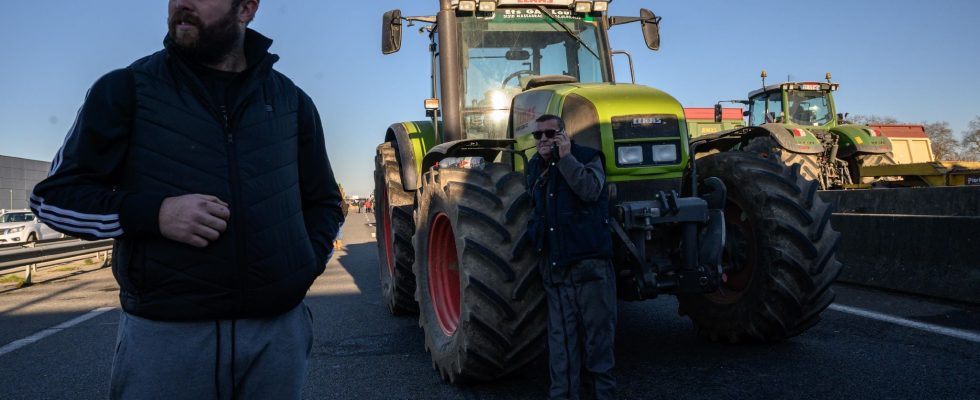The week promises to be hectic for farmers. Arnaud Rousseau, the president of the first French agricultural union, the FNSEA, warned, Monday January 22, on France Inter the launch throughout France of actions by farmers who are calling on the government to hear their “fed up” and their “anger”.
“I can tell you that from today and throughout the week and for as long as it is necessary, a certain number of actions will be carried out,” he declared, while several blockages are already taking place in Occitanie .
These actions will concern “each department”, he said, stressing that “the rise in tension is strong, hence the need to provide concrete responses”.
They will be received by the Prime Minister
The Prime Minister, faced with his first crisis since his appointment on January 11, will receive Arnaud Rousseau and his Young Farmers (JA) counterpart Arnaud Gaillot at 6 p.m. If the government is “not there”, “we could be at the dawn of a big agricultural movement”, declared Monday morning the president of the JA, on France 2.
Since Thursday evening, several dozen operators have been blocking the A64 motorway, which links Toulouse to Bayonne, near Carbonne, in Haute-Garonne. Farmers also blocked access to the Golfech nuclear power plant in Tarn-et-Garonne on Monday.
Demonstrations provoked by financial burdens and environmental standards considered too heavy, recurring reasons for discontent in the profession that the government has been trying to manage for years to avoid opening a new social front.
In December, former Prime Minister Elisabeth Borne announced to the FNSEA and the JA the abandonment of tax increases on pesticides and irrigation, arousing the irritation of environmental organizations and water stakeholders.
The government fears a conflagration because, from the Netherlands to Romania via Poland and Germany, farmers are stepping up actions against tax increases and the European Green Deal. All this against a backdrop of inflation and competition from Ukrainian imports.
The United Kingdom is not spared: fruit and vegetable producers will demonstrate on Monday in front of Parliament in London to protest against the “unfair” purchasing contracts which bind them to mass distribution.
“Simplification”
In France, the profession is also scalded by the successive postponements of the agricultural bill, promised more than a year ago by Emmanuel Macron and ultimately less ambitious than the “agricultural orientation law” initially announced. On Sunday, Minister of Agriculture Marc Fesneau announced a new deadline. The text, which was to be presented to the Council of Ministers on Wednesday, will only be presented in “a few weeks” with the aim of being debated in Parliament “in the first half of 2024”.
The bill that the government must present intends to promote generational renewal in agriculture, a necessity at a time when the population of nearly 500,000 farm managers is aging.
It will be completed to allow a “simplification” of the multitude of regulations imposed on the profession, Marc Fesneau promised on Sunday. “A drastic simplification of standards” is necessary, added the Minister of the Economy Bruno Le Maire on TF1. “The sooner the better. (…) We really want to talk about competitiveness,” Arnaud Rousseau said Monday morning.
Less than five months before the European elections, the oppositions are courting the agricultural world. Starting with Jordan Bardella, president and head of the list of the National Rally, who castigated on Saturday from the wine-growing Gironde “Macron’s Europe which wants the death of our agriculture”.
Both right and left have asked the executive to renounce increasing taxation on non-road diesel, a progressive measure, negotiated this summer between the Ministry of the Economy Bercy and the majority union FNSEA, in exchange for compensation.
Operators “have no other choice but to use them,” noted Communist Party boss Fabien Roussel on Sunday. We must “immediately renounce this measure”, affirmed the leader of the Les Républicains deputies, Olivier Marleix, providing “very clearly” his support for the mobilization. On the Brussels side, a meeting of agriculture ministers is planned for the start of the week.
